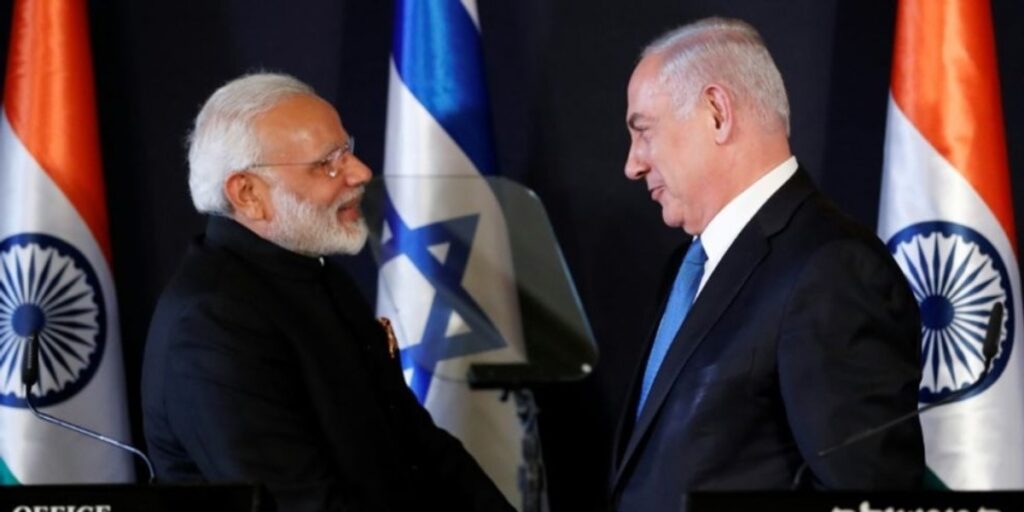ISLAMABAD: Israel’s long-standing policy of targeting the nuclear ambitions of neighboring states through aerial operations has consistently proven effective.
Its success lies in a combination of superior airpower and the inability of its adversaries to form cohesive military alliances.
With Iran likely to remain under a permanent aerial surveillance regime, Professor Meir Masri of Hebrew University has indicated that Pakistan could emerge as the next focus of Israel’s strategy to dismantle regional nuclear capabilities.
This approach is rooted in Israel’s deep concern over the vulnerability of its concentrated population centers, which was evident when it demanded air defense guarantees from France during the 1956 Suez Crisis.
The U.S. and Israel have historically shared concerns over nuclear weapons falling into non-state hands, especially in the context of Pakistan’s nuclear development and unsecured nuclear materials after the fall of the Soviet Union.
Israel has taken preemptive military action against Egypt’s missile program in the 1960s, Iraq’s Osiraq reactor in 1981, Syria’s nuclear site in 2007, and is now actively targeting Iran.
This consistent pattern highlights Israel’s commitment to neutralizing threats before they fully emerge.
Two interlinked reasons fuel this stance. First, the unresolved Palestinian issue, exacerbated by Israel’s policies of economic suppression, keeps neighboring Muslim states hostile.
Second, Israel’s broader territorial vision—requiring control over water resources from the Jordan River—hinges on a future in which Palestinians are relocated eastward.
Egypt, once the primary Arab adversary and backed by the Soviet Union during the Cold War, never granted Moscow military bases.
The 1967 Six-Day War partly stemmed from Soviet efforts to pressure Israel to halt its nuclear activities.
However, Egypt’s value to Moscow lay more in arms trade than ideology.
At the same time, U.S. policymakers were wary of the cost of arming Israel and its potential to provoke regional instability.
Nevertheless, they found Israeli strikes to serve as a convenient way of halting proliferation without direct U.S. involvement.
For instance, Israel’s 1981 attack on Iraq became possible after Baghdad distanced itself from Soviet influence due to tensions with Syria.
Though Washington publicly condemned the strike, it continued to supply weapons to Tel Aviv, viewing Arab states’ nuclear pursuits as an inevitable result of internal misrule and economic hardship.
During the 1970s and 1980s, concerns over Pakistan’s nuclear program were openly discussed by Israel’s supporters, with some advocating strikes from Indian soil.
However, U.S. strategic reliance on Pakistan during the Soviet-Afghan War put a stop to such suggestions.
When Iraq launched missiles at Israel during the 1991 Gulf War, Israel held back from retaliation to preserve U.S.-led Arab alliances.
In the 2000s, neoconservative voices in the U.S. administration aligned with Israel to push for regime change in Iraq.
Following Iraq’s military neutralization and U.S. occupation, Israel turned its attention to Iran.
Despite technical capacity for long-range missions, Israel hesitated to strike Iran due to logistical challenges and vulnerability of its support aircraft. The downfall of Syria and the loss of its radar infrastructure has now allowed Israeli and allied tankers to operate more freely in Jordan and western Iraq, enabling deeper penetration missions. Israel’s 2007 airstrike on Syria’s reactor near the Turkish border demonstrated its capacity for precise, high-risk aerial operations.
Israel’s success has been bolstered by the disunity among potential regional nuclear powers.
States like Egypt, Iran, Turkey, and Pakistan often distrust one another and form weak, temporary alliances based on arms deals rather than shared strategic goals.
This lack of coordination mirrors the disjointed Axis powers in WWII, who failed to support each other in key battles.
The current Israeli campaign against Iran is feasible largely due to Tehran’s diplomatic isolation. The U.S. has successfully limited Russian and Chinese support for Iran.
Former President Trump played a significant role by scaling back aid to Ukraine and enforcing trade tariffs on China, further weakening Iran’s alliances.
As Iran’s nuclear capabilities come under pressure, Israel could shift focus to Pakistan.
This would align American political factions supporting India, Israel, and military preparedness against China into favoring pressure—diplomatic or military—on Islamabad.
A coordinated attack using air power and missile strikes, possibly launched from Indian bases, could significantly damage Pakistan’s nuclear infrastructure.
An Indian offensive could simultaneously aim to divide Pakistan territorially and secure Kashmir, severing China’s route to the Indian Ocean.
Unlike Iran’s deeply protected facilities or Iraq’s dispersed systems, Pakistan’s nuclear sites are more exposed.
Pakistan does, however, possess strategic depth. It maintains more nuclear warheads than Israel and has the capability to modify Chinese-supplied missiles to reach Israeli targets.
Saudi Arabia also supports Pakistan and has access to its warheads via the CSS-2 missile system.
Moreover, U.S. officials are wary of India gaining too much power in South Asia and recognize that Pakistan’s nuclear capability serves as a deterrent to India’s regional dominance.
China, despite tensions over Kashmir, supports Pakistan militarily, allowing Beijing to maintain a minimal presence along the Himalayas.
Pakistan has also collaborated with China by deporting Uyghur activists, strengthening bilateral ties.
However, Beijing’s willingness to assist Islamabad militarily may depend on its own domestic political stability.
Several factors could dissuade Israel from launching a direct strike on Pakistan.
These include Pakistan’s sizable nuclear stockpile, long-range missile capabilities, and regional alliances.
Yet Israel may still push for international pressure or covert operations aimed at limiting Pakistan’s arsenal.
Ironically, the Muslim-majority states often viewed as ideologically united have historically pursued nuclear capabilities independently and remain wary of each other.
Their mutual suspicions have indirectly aided Israel’s counter-proliferation efforts.
ALSO READ: Israel’s silent hand in Balochistan unrest
Although most of these nuclear programs were not intended for use against Israel, Tel Aviv perceives them as long-term threats due to the potential for regional conflicts to escalate under a nuclear shield, as has been seen in the India-Pakistan dynamic over Kashmir.





